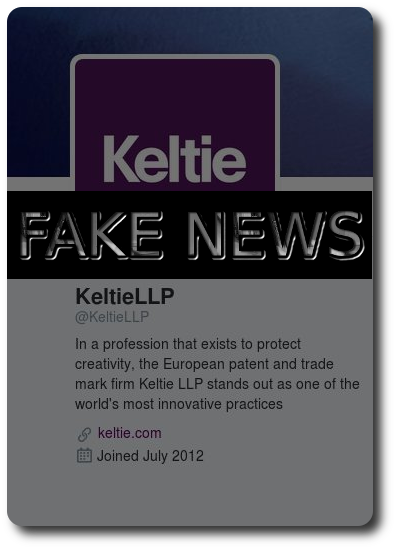

Kat-lie or Kel-tie?
THE EPO we're already accustomed to hear nothing but lies from; but a growing number of law firms, including some that are based in London, tarnish their reputation by making false predictions that are politically and financially (self gain) motivated. These false predictions -- if not outright lies and blatant falsehoods -- can cost their clients dearly, as these clients are being fooled if not lied to, e.g. regarding the 'benefits' of UPC to SMEs.
[PDF] and the following summary in English (it's also available in German). To quote:
The British ratification paradox,
Article on the recent political statements as regards a ratification of the UPCA in the United Kingdom and their legal implications (02/02/2017)
Most recently, statements with relevance for the ratification of the Agreement on a Unified Patent Court (“UPCA”) made by members of the British government caused astonishment. While the new British Minister of State for Intellectual Property, Joseph Johnson, underlined the ratification intent, Prime Minister Theresa May shortly afterwards, in her speech on the “Brexit” negotiations, defined a number of objectives which appear hardly reconcilable with such ratification. In this context, it is also of interest that, contrary to the political guidelines set by the previous Prime Minister Cameron and against the broad opposition of the professional circles, the CJEU can be expected to have gained an interpretation competence also in relation to material questions of unitary patent protection, as a consequence of the compromise in the dispute on former Art. 6 to 8 of the “unitary patent” Regulation. The following article describes the statements and their legal implications in more detail.
The Brexit White Paper makes an interesting read: "We will bring an end to the jurisdiction of the CJEU in the UK".
So bye bye UK participation in the UPC, then? Or might this not quite mean what it says? The subsequent sentence perhaps gives a clue.
"We will of course continue to honour our international commitments and follow international law".
I guess that one could characterise the UPCA as "international law", and so this perhaps leaves the government with some "wriggle room". However, it will be interesting to see how (if at all) the government manages to "square the circle" where obeying international law (such as the UPCA) requires the CJEU to have jurisdiction in the UK.
Based upon my observations to date of UK politicians, I predict that the mutual incompatibility (with respect to e.g. the UPCA) between the two above-quoted statements will be handled in the usual manner. That is, the government won't bother trying to explain itself. It will just be evasive and change the topic.
The same approach will be used to handle the question of how free trade with the EU can be achieved without submitting to common rules (and the jurisdiction of a court that interprets those rules)... especially as the proposed alternative (a dispute resolution mechanism that does not have direct effect in UK law) is very unlikely to be palatable to the other EU Member States.